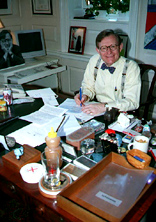| Narrators |
 |
E. Gordon Gee
Interview and story by: Carly Long |
We Misread Our Own Power
I am a product of the 1960's. I was in that generation gap, of moving from a time of quiet in this nation into one of the most divisive periods in the history of this land. I went through all of it. I am a reflection of that. My personality, my views, my politics, my sense of being, who I am, are all so much tied up in that era.
I was born in Utah in 1944 in a very rural part of the state. It was a very religious community and a very socially and intensive environment. About ninety percent of the people in my hometown were Mormons. My mother and father were very active citizens. They were both Republicans and quite conservative.
From the age of sixteen, I wore bow ties; whatever was nerdy, I was probably wearing. I went to Utica High School. I wanted to be a physician, but I soon found wider interests beyond medicine. I enjoyed public policy. I went to the University of Utah for my undergraduate degree and to law school for my graduate degrees, my law degree and my doctorate at Columbia University in New York City. After that, I went into an academic life as a teacher and now I pursue an academic administrative career. I am currently the president of Brown University.
I graduated from college in 1968. The counter-culture was something that was recognized from Woodstock, from drug culture in San Francisco, things I read about in magazines. I did not directly experience them until I went away to law school. In law school, I was exposed to the panorama of issues that one confronts in the world because New York City was like Baghdad on the Hudson. I viewed the people who participated in these rallies or teach-ins as my friends. I would have good vigorous arguments with them, but they remained my friends. They were generally peaceful, but at Columbia, they were really quite violent.
My generation was the front end of the Vietnam War generation, the back-end of the "Happy Days" generation. When I got to college, I was very interested in politics. The election of John F. Kennedy was the first time that I could think of myself engaging in political discussion. I am an Independent and plot my own political course. I listen carefully. I have always taken pride in the fact that I have not immediately formed opinions about anyone. I was not thrilled with the Black Power Movement, and some of the others because I thought they were aggressively disruptive, but there were lessons learned from them.
Women's issues were always very important in my life. I come from a very committed family of feminists. My mother was a feminist in the early 1900's and remains so today. I have lived with people, very strong women, with very strong views, which I deeply appreciate. I am a feminist myself. I have always promoted the Feminist Movement, and it is reflective of the people that I hire. I have vast numbers of women who have worked with me over the years.
I was in Germany, working for our church as a Mormon missionary when I became aware of the war in Vietnam. There was a large influx of American troops in Germany, and I kept getting notice for my draft on my return.I was absolutely dreading the idea of having to go into the Army and going to Vietnam and fighting. However, since I had a very serious ulcer at that time, probably from worrying about the war; I was never called up.
I knew a number of people who served, and I knew several people who were killed. It was rather apparent to me that we had no will to win. I was disgusted by those in the far right and the far left. I thought that we had not been honest with ourselves, the American people, or with those who were fighting. My opinion of the War was that because of our inability to have the will or the courage, or the tactics to win that we should have gotten out. We misread our own power and our own will, and we most certainly misread the Vietnamese.
The Vietnam War was the first time on our television screens that we actually saw war being played out, "Live at six." I think that the impact on the American psyche was absolutely clear-cut and also the fact that we were clearly not winning the war. The American's always have had a belief that winning is everything. When I saw Vietnam vets in wheelchairs and on crutches, and the body bags coming home from Vietnam, I felt a deep sadness. I think that it was one of the most divisive and clearly intense moments for all times in the history of this nation. I think that we all felt absolutely affected by all of that. We learn from our history. I hope we have learned from our divided past how we can reknit our future.
| Glossary Words On This Page |
|---|
|
black power counter-culture |
draft feminism |
generation gap John F. Kennedy |
teach-in Vietnam |
Woodstock |